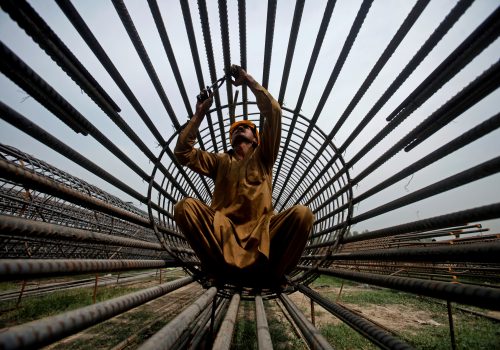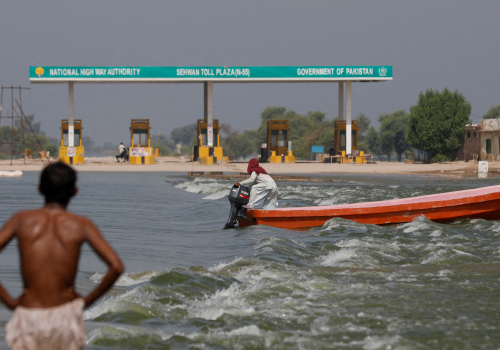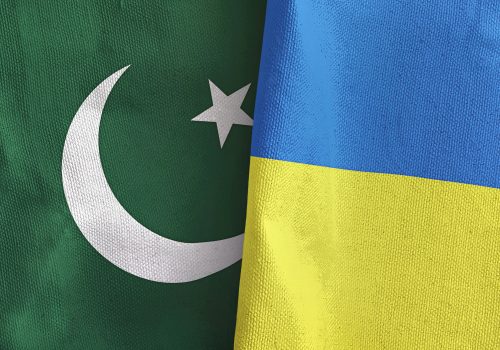Pakistan’s long journey toward sustainable growth requires timely, free, and fair elections
Pakistan has been facing growing political and economic instability over the past few months. Inflation has continued to hover around 30 percent, economic growth has plummeted, and the country remains reliant on support from the International Monetary Fund and from bilateral partners such as China and Saudi Arabia to keep its economy afloat. Imran Khan, the country’s most popular politician, remains in jail while his political rival, Nawaz Sharif, has returned to Pakistan after spending years outside the country.
These challenges have been compounded by major geopolitical events, including the withdrawal of US forces from Afghanistan in August 2021, Russia’s invasion of Ukraine in February 2022, and the ongoing Israel-Hamas conflict.
To discuss these and a host of other issues facing Pakistan, the Atlantic Council and the Johns Hopkins University School of Advanced International Studies hosted their second annual Pakistan conference on November 1-2. This year’s theme was resilience and reforms, and speakers addressed topics including the future of artificial intelligence, the role of middle powers in today’s volatile geopolitical environment, and ways in which Pakistan’s economy can be reformed so that it generates opportunity for the many, not just for the few. A central tenet of both panel discussions and sidebar conversations was that Pakistani policymakers must pursue reforms in a way that builds resilience across millions of households. To do this, policymakers must turn their focus away from simple notions of economic growth and toward a more rigorous interest in improving overall human development in the country.
Below are several key takeaways I heard from scholars and practitioners from Pakistan and the United States:
Timely, free, and fair elections are a catalyst for the reforms journey. While there was broad consensus that there is still a chance of further delays to the next national elections, the recent announcement that they will be held on February 8, 2024, was seen as a positive sign. Participants agreed that without free and fair elections, the political drama that has engulfed Pakistan is likely to continue. In addition, it is important for the military to be seen simply as a provider of security and to extract itself from both overt and covert electoral interference.
So long as the ongoing political instability remains, Pakistan’s economic and foreign policy will remain chaotic. For Pakistan to begin a long and tortuous journey toward economic recovery and sustainable, inclusive growth, elections need to be held as soon as possible.
Elections should then be followed by a transparent, consensus-driven process that devolves power to the grassroots level through functional local governments. Increasing political competition at the grassroots level is not only a constitutional duty, but also a critical mechanism through which the daily needs of citizens can be met. In addition, this devolution of power can help improve local resource mobilization while also strengthening the ability of constituents to hold their political leaders accountable for their performance.
Macroeconomic struggles are a symptom, not the disease. A common theme across panels was the consistent view that Pakistan’s human capital challenges, especially those confronted by Pakistani women, are a major driver of economic instability. Childhood stunting and poor educational investments have led to major drags on economic growth. In addition, as the planet becomes warmer, Pakistan will face an intensified need to cool and provide heat-resilient infrastructure to vulnerable communities. Environmental degradation is also likely to further exacerbate human capital issues, especially those related to public health and productivity.
Another consensus view was that frictions in the market, largely due to a state apparatus which refuses to get out of the way, distort the economy. Therefore, Pakistan must follow a two-pronged plan to deal with its crises: radically improve educational and public health services while pushing through market reforms that eliminate significant parts of an interventionist and overly burdensome bureaucratic and regulatory system. Such reforms would make long-term investments that grow productivity while providing the space that helps unleash the spirits of entrepreneurship and innovation.
Growing geopolitical uncertainty should concern Pakistani elites. With its domestic political system in a state of perpetual crisis, Pakistan can ill afford additional escalation in regional and global tensions. The Russian invasion of Ukraine is an example of how seismic geopolitical events can unleash political and economic crises in a country geographically far away, such as Pakistan. The ongoing Israel-Hamas conflict is inflaming emotions across the world, especially in Muslim-majority countries. The longer this conflict continues, the more likely a scenario that a split between elites who execute foreign policy and ordinary citizens occurs. This development is likely to trigger popular anger targeting elites, especially in a situation where citizens believe the government does not have a credible mandate to govern.
Former Pakistani Prime Minister Imran Khan’s history of populism and his sustained imprisonment may add fuel to the fire. In addition, a broadening of the Israel-Hamas conflict can also increase economic shocks due to rising energy prices, unleashing a new wave of inflation. This growing economic pain would likely further inflame the public, creating additional instability in the country. Policymakers must also recognize that Saudi Arabia and other Gulf Cooperation Council countries are looking to make investments in Pakistani assets, but materializing these investments requires interlocutors on the Pakistani side that are able to understand and complete basic financial transactions. At this point, Pakistan’s public sector is severely lacking the capacity to realize this opportunity.
Resource misallocations create headwinds for economic prosperity. With a burgeoning fiscal deficit that is being financed through domestic borrowing, Pakistan must get its financial house in order. Doing so requires policy changes in the way the state both collects and spends resources. Existing leakages can be plugged by scaling back the magnitude of untargeted subsidies, while moving resources toward targeted, direct transfers to citizens. This can be done by expanding access via zero-balance bank accounts, which receive government benefits ranging from poverty alleviation funds to subsidies for fertilizer and liquefied petroleum gas cylinders. These direct transfers would improve living conditions for the most marginalized citizens in an efficient way, freeing up resources while improving human development outcomes.
The incentive structure for investment must be altered through tax policy to attract capital flows in productivity-enhancing sectors where the country has a comparative advantage. The government must create a more enabling environment for productivity-enhancing sectors while also changing the tax code to reduce flows of capital to dead assets, such as vacant real estate. In addition, the startup ecosystem—which includes non-tech startups—should be encouraged to grow by changing the regulatory framework governing venture capital. In addition, investments should be made in public transport infrastructure, as it is an efficient mode of urban transportation that will help curtail the growing costs of imported energy.
Finally, it is important to maintain focus on the human development elements of long-term productivity growth. Nutrition, clean water, and energy access inequities, for example, lead to issues related to stunting across Pakistan. Without investing resources to solve these human development challenges, resources dedicated toward boosting certain sectors will always lead to suboptimal outcomes. As a result, improving both service delivery and allocation of resources focused on improving human development across the country is vital for long-term economic success.
The ongoing convergence of technologies is a leapfrog opportunity. Artificial intelligence, battery storage, 3D manufacturing, and electric mobility are just some of the transformative technologies radically changing the world. As these technologies mature, new business models, and by extension economic centers of power, are likely to emerge. While advanced economies such as the United States and China are competing at the cutting edge of many technology trends, other countries such as Turkey and Estonia are also showing prowess.
Countries such as Pakistan can take advantage of these converging technologies by improving their human capital quality in the long run and providing greater backing to next-generation ventures. This can be done through a public-private partnership model, setting up a sovereign innovation fund that partners with other leading global investors. By backing a domestic innovation ecosystem, Pakistan can begin to create competitiveness in future-oriented sectors that will have global relevance. Sustained bets on next-generation innovative companies are necessary to create wealth within the country.
The climate threat requires a long-term whole-of-nation approach. The 2022 floods are evidence that Pakistan is ground zero for extreme weather events in an era of climate disaster. Dealing with this threat requires a fundamental overhaul in how the country develops and executes policies, including those related to water management, the power sector, and agriculture. Inefficient allocations of resources, such as subsidies for tube wells, should be rechanneled toward building climate-resilient infrastructure on farms. This can include investments for better seeds, improved soil management, and drip irrigation to improve agricultural productivity.
Investments that expand access to renewable energy—for example, through decentralized solar grids—should also be encouraged. Creative mechanisms to finance rooftop solar can also expand financial inclusion, particularly in rural Pakistan. Finally, doing away with the single-buyer model in the power sector can help eliminate current power sector inefficiencies that have restricted investments and created a burgeoning debt across the entire energy ecosystem. Finally, Pakistani policymakers must pursue these policies in a way that furthers climate, economic, and environmental justice, as this is critical to not only building resiliency across millions of households, but also improving overall human development in the country.
Uzair Younus is the director of the Pakistan Initiative at the Atlantic Council’s South Asia Center.
Further reading
Mon, Aug 28, 2023
Pakistan has a capital problem. Infrastructure investment can be a solution.
New Atlanticist By Ammar Habib Khan
Islamabad must utilize unconventional tools to mobilize local private capital and reallocate it toward infrastructure development.
Fri, Sep 15, 2023
Empowering Pakistan’s youth to address climate change risks
Issue Brief By
Pakistan is highly vulnerable to climate change impacts like flooding and heatwaves. Empowering Pakistani youth in climate adaptation is critical as they will face intensified effects. This brief advocates for greater involvement of youth through grassroots organization, policy advocacy, innovative solutions, and strengthening international cooperation on climate action.
Fri, Sep 22, 2023
Why Pakistan must side with Ukraine over Russia
New Atlanticist By Uzair Younus
Islamabad should look at the evolving global situation pragmatically and recognize that a strong Ukraine that defeats Russia is in its Pakistan’s interest.
Image: A view is seen of a busy street in Karachi June 29, 2013.


